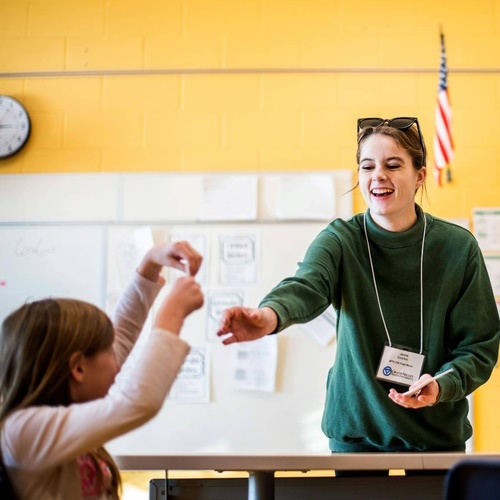GVSU Education Programs News
GVSU Addressing Educator Shortage
March 07, 2023

The shortage of educators across Michigan has left school districts and superintendents searching for qualified teachers to lead classrooms. A series of programs and initiatives by the College of Education and Community (CECI) Innovation is making sure the next generation of educators is not only ready to fill classrooms but will remain there.
“When novice teachers are well-prepared for the profession, they tend to remain in the field long term,” said Amy Schelling, Associate Dean in CECI. “Developing well-prepared teachers is our number one focus, consistently.”
GVSU has multiple programs and collaborations working across generations and communities in the field of Teacher Education to address Michigan's educator shortage and prepare new teachers.
Elementary Program
Sherril Soman, Dean of CECI, said when Michigan rolled out new state standards for Elementary certification, CECI revised its own Elementary initial certification program. The revisions created a more integrated, streamlined curriculum which reduced the time length to a degree from five to four years.
The new Elementary major is paired with a content major called Pedagogical Content Knowledge for Elementary Teaching (PCKET). Grand Valley’s Elementary Education programs are somewhat unique in Michigan: students are dual majors, pursuing a content major through the College of Liberal Arts and Sciences and an Educational Studies major through the College of Education and Community Innovation. The revised Elementary program meets state requirements while continuing to provide the rich knowledge of disciplines that sets GVSU-trained educators apart, said Amy Masko, Professor of English Education and PCKET Major Coordinator.
Creating the new major required intense collaboration and melding of different processes and philosophies from the previous model for training Elementary teachers. Those who created the program also emphasized fieldwork earlier in students’ academic career.
“I think it’s really quite an excellent model and teachers are going to come out of this really well prepared,” Masko said.
A key change at the state level was that certification for Elementary Education teachers, which used to be K-8, was separated into two bands: PK-3 and 3-6. In addition, Masko said, all education students used to study a teachable major in a single subject, such as math or social studies. That has now changed. The Elementary program now provides students with the ability to have an emphasis in a subject area, while being well-prepared to teach all subject areas at the Elementary level.
Graduate Teacher Certification (GTC) Program
CECI also refined and expanded its Graduate Teacher Certification (GTC) program to meet the needs of its PK-12 partners. The GTC pathway is an accelerated and intensive initial certification program designed for learners who already have a bachelor’s degree.
Along with their coursework, students complete two semesters of clinical fieldwork under the direction of a mentor teacher and clinical instructor. At the completion of the GTC program, students will have earned a teaching certificate as well as graduate credit toward a master’s degree.
LEADS Program
This fall CECI, in collaboration with the College of Liberal Arts and Sciences and Brooks College of Interdisciplinary Studies, will implement an 18-credit pathway within the LEADS program, an accelerated, online curriculum for adult learners. The education LEADS pathway is aimed toward paraeducators and others who already work in support positions at schools. Paired with the GTC program, individuals will be able to obtain a bachelor’s degree and an initial teaching certificate in Elementary education.
High School Collaborations
CECI is also guiding high school students at teacher academies, such as the one at Kent Career Tech Center. Schelling said she and CECI Educational Foundations faculty worked closely with KCTC academy instructor Laura Castle to support the development of the curriculum, which involves instruction on the foundations of teaching and learning, core teaching practices as well as receiving time in classrooms working with children.
“Efforts like these are really important because it supports the fostering of exploration and interest in the profession while students are still in high school,” Schelling said. “We’re hoping to really build those connections so they can see themselves on the path to becoming a teacher.”
The article photo shows Jenna Ezerkis, who is studying Elementary education, playing a math game with Ellie Allers, 9, during a visit to Evergreen Elementary School in Allendale.
This story was revised by Alex Jacobsson from an article published in GVSU's Grand Valley Magazine. For more information on this story, contact Peg West or Brian Vernellis in University Communications - (616) 331-2221.
